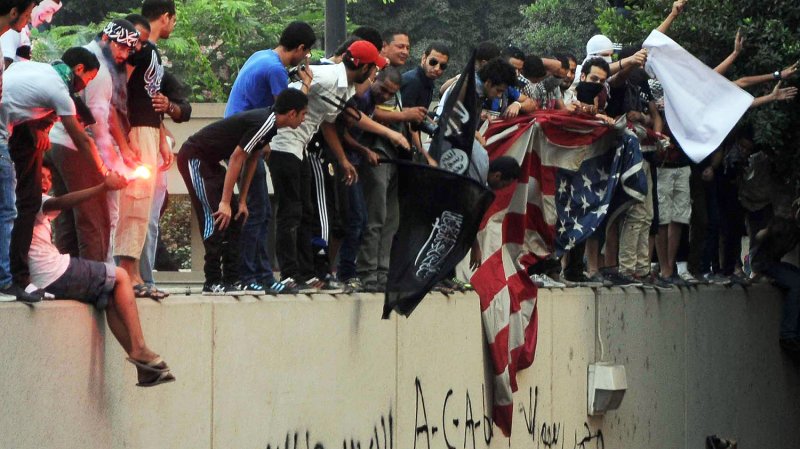Egyptian protesters tear down an American flag at the United States embassy in Cairo on September 11, 2012. UPI/Ahmed Jomaa |
License Photo
A video clip posted to YouTube two months ago has been cited as the catalyst for riots in Egypt and Libya, claiming the lives of U.S. Ambassador Christopher Stevens and three others. Now, YouTube has temporarily blocked access to the controversial video for users in Egypt and Libya, but has left the video on its website, citing that it does not violate the company's policies.
“This video -- which is widely available on the web -- is clearly within our guidelines and so will stay on YouTube,” a company rep said in a statement. “However, given the very difficult situation in Libya and Egypt, we have temporarily restricted access in both countries.”
The 13-minute-long trailer for "Innocence of Muslims," mocks the prophet Muhammad, calls him a fraud and portrays him as a child molester. The offensive, low-grade film was posted to YouTube about two months ago by 52-year-old Sam Becile, a real estate developer in California, and later approved by Florida pastor Terry Jones, who called it "an American production, not designed to attack Muslims but to show the destructive ideology of Islam."
After Egyptian television aired a version of the clip translated into Arabic on Tuesday, Egyptians stormed the U.S. Embassy in Cairo and tore down the American flag. According to The New York Times, the Arabic clip has since been removed for copyright infringement.
Afghanistan's government banned all access to YouTube in the country until the company removed the video Thursday, worried that its content could incite the kind of protests rocking Egypt and Libya.
When Fast Company first asked YouTube whether they would pull the video of their site, a rep responded:
While we don't comment on individual videos, what I can tell you is that on YouTube, people worldwide can express themselves by sharing videos in a safe and legal manner, and this sometimes raises cultural and political issues. We have created Community Guidelines to set a global standard for our users. We take great care when we enforce our policies and try to allow as much content as possible while ensuring that our Community Guidelines are followed. Flagged content that does not violate our Guidelines will remain on the site.
The video, which now has more than 12,500 comments, has ignited a debate about free speech on the internet, arguably the world's most important medium for free expression. Some comments call for the site to flag the video as inappropriate, while others believe that YouTube should support the filmmakers' right to post his video, no matter how hateful, in the name of free speech.
"Freedom of speech is a privilege. One that these filmmakers have abused," said one commenter.
YouTube's guidelines prohibit "hate speech," defined as "speech which attacks or demeans a group based on race or ethnic origin, religion, disability, gender, age, veteran status, and sexual orientation/gender identity."
"We encourage free speech and defend everyone's right to express unpopular points of view," the site also says.







